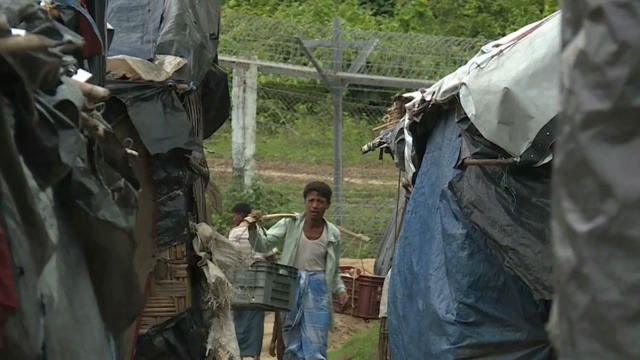U.N. Secretary-General Antonio Guterres is in Bangladesh to assess the needs of Rohingya refugees. The visit comes nearly a month after the U.N. and Myanmar made a deal for their return.
But progress has been slow, and for the Rohingya living on the Bangladesh-Myanmar border, the wait is taking its toll. CGTN’s Ravinder Bawa reports.
Follow Ravinder Bawa on Twitter @ravsbaws
More than 1,200 families live under the shadow of death on a thin strip of land between Bangladesh and Myanmar. They have been living on the embankment of Tombru canal, a ‘no man’s land’ which divides the two countries.
Mohammed Rafique, a Rohingya refugee, told CGTN how they live in fear daily as the security forces have been pressuring them to vacate the land.
“We are always afraid here,” he said. “They try to chase us away, shouting on loudspeakers all day, saying ‘You are Bengali, go back to Bangladesh.’ We’re scared and now water is rising in the canal, making us more afraid.”
There are many other hurdles in their survival. Aid agencies provide food and some shelter, but for other needs, these refugees are left to fend for themselves.
About ten people have died since they moved here. Two of them were children who died of diarrhea and pneumonia. A pregnant woman and her baby died because there is no medical facility available here. Leading a life of hardship, many are now giving up.
Another refugee, Noor Ayehsa, believes they, “won’t be able to stay here anymore. We are trying to move to another place. We came here to save our children. I’m afraid my children will die here. The river water rises up to here when it rains. Our houses will be flooded.”
Monsoon season has forced them to rethink their decision to stay in the border area. Many stayed with the hope of being the first ones to be repatriated. Though a repatriation agreement has been signed between the United Nations and Myanmar, nothing concrete has happened yet.
Rohingya have no country to call their own, and those living in no man’s land are in the worst circumstances. But despite the problems, they hold on, because the borderland is where they feel closest to home.
 CGTN America
CGTN America
